Top Diplomat Claims Iran is ‘Pillar of Region’ on Iraq Tour

Iran's Acting Foreign Minister Ali Bagheri Kani claimed that Iran and Iraq are "two main pillars in the region" while Iran continues to destabilize Iraq through its Shia proxies.

Iran's Acting Foreign Minister Ali Bagheri Kani claimed that Iran and Iraq are "two main pillars in the region" while Iran continues to destabilize Iraq through its Shia proxies.
During a joint press conference in Baghdad with his Iraqi counterpart Fuad Hussein on Thursday, he blamed the region’s instability on Iran’s archenemy, Israel, currently at war with Iran-backed Hamas in Gaza.
“All countries in the region are together with interaction and solidarity to build a secure and stable phase, and it is the Zionists who have shown that they are the main factor in the instability of the region, he said.
Iran’s largest proxy, Hezbollah, is currently at war with Israel on its northern border with Iran’s Yemeni proxy, the Houthis, targeting the country’s south with its Red Sea region blockade and a series of missile and drone attacks.
The latest assertion from Iran’s acting foreign minister came amidst widespread accusations of the regime’s role in destabilizing Iraq by supporting militia groups that challenge the sovereignty and governance of Iraq through its backing of Shiite armed groups.
Bagheri's trip includes high-level meetings with Iraqi officials, including Prime Minister Mohammed al-Sudani and President Abdul Latif Rashid, extending his outreach to the Kurdistan Region to engage with Kurdish leaders Nechirvan Barzani and Masoud Barzani.
The visit is part of a broader regional tour that previously included stops in Lebanon and Syria, where Bagheri met with figures such as Hezbollah chief Hassan Nasrallah and Syrian President Bashar al-Assad as Iran seeks to expand its influence across the region.
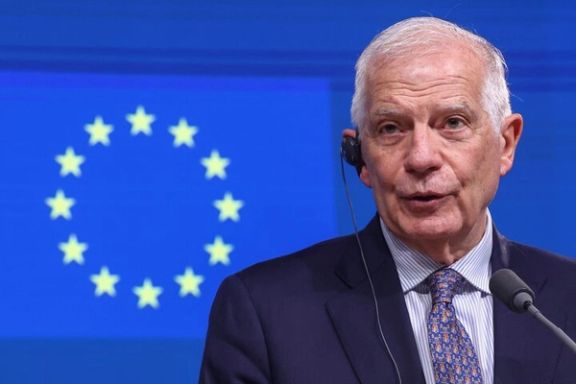
Josep Borrell, the European Union's Foreign Policy Chief, has demanded Iran release its European hostages, including an EU representative.
Following the phone call with Ali Bagheri-Kani, Iran's acting Foreign Minister, on Wednesday, Borrell said the two touched on several topics, in addition to the detention of the EU’s Johan Floderus.
"We had frank exchanges, including on issues pertaining to Iran’s nuclear program, the war in Gaza, and tensions at the Israel-Lebanon border,” he said.
He also used the opportunity to demand the release of European citizens currently imprisoned in Iran, reflecting ongoing European concerns over what many are calling Tehran’s “hostage diplomacy” tactics.
French President Emmanuel Macron announced on Wednesday the release of another French citizen, Louis Arnaud, previously imprisoned in Iran.
Foreign Minister Stephane Sejourne also said "Our diplomatic service is still at work" to free three other French citizens: Jacques Paris, Cecile Koller and a man named only as Olivier held in Iranian jails.
Arnaud's case had drawn significant media attention after his arrest in September 2022 during protests over the death of Mahsa Amini—a young Iranian Kurd who died in custody for allegedly violating hijab.
While Arnaud's companions were released shortly after their detention, he was sentenced in November 2022 on charges of “propaganda and harming Iranian state security.”
At the same time, On Monday, Tehran had announced ongoing efforts to secure the release of Bashir Biazar, a former managing director of Iran's state broadcaster who has been detained in France and is awaiting deportation.
Nasser Kanaani, the spokesperson for the Iranian Foreign Ministry, said Monday that diplomatic actions have been taken since the moment they were informed of Biazar’s arrest, without elaborating further.
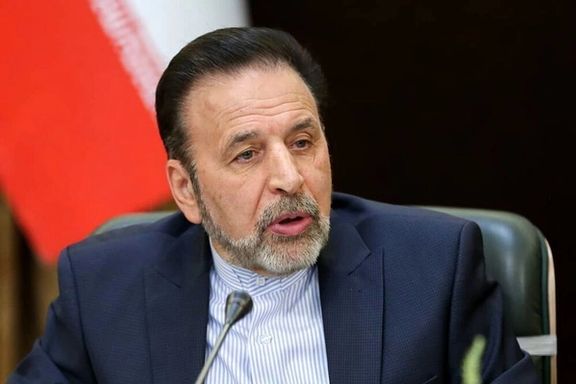
Mahmoud Vaezi, the former Chief of Staff to ex-President Hassan Rouhani, has openly critiqued Masoud Pezeshkian's stance on reform ahead of the presidential elections scheduled for June 28.
Vaezi's comments on the only pro-reform candidate in the race highlight the importance of candidates’ allegiance to the Supreme Leader, Ali Khamenei, in order to succeed.
“Pezeshkian must clearly tell the people that I have been seeking 'change' from the past, and today the opportunity has arisen for change to occur in people's lives," Vaezi remarked amid Iran’s economic crisis and the worst social crackdowns in the history of the Islamic Republic.
Further underlining the expectations placed on Pezeshkian, Vaezi shared that many are urging him to facilitate an endorsement from former President Rouhani. "Many people talk to me, asking me to speak to Former President Hassan Rouhani so that he supports Pezeshkian. This is what the people tell us... We hope that the candidate himself will more clearly reflect to the people what is necessary for change," Vaezi added.
However, skepticism about Pezeshkian’s potential for genuine reform is growing with five of the six candidates staunchly pro-regime. His recent televised interview, which focused primarily on economic issues without touching on more contentious subjects such as foreign policy, the nuclear program, or the mandatory hijab law, has left many supporters disillusioned as the country cries out for change.
Critics argue that his avoidance of critical topics indicates a potential alignment with the prevailing views rather than a departure from them if he is to stand a chance in the upcoming polls which follow the sudden death of Ebrahim Raisi in a helicopter crash last month.
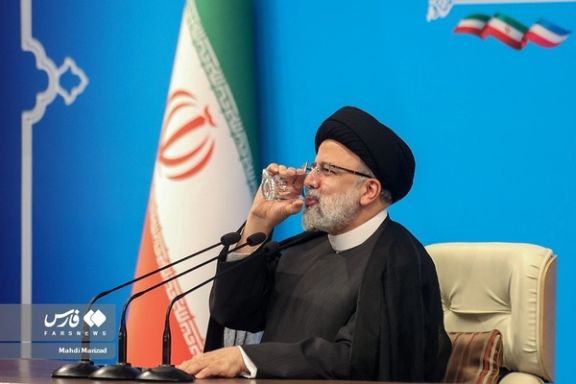
Iran’s economy minister says the government budget’s tax revenues reached 8,000 trillion rials ($13.5 billion), achieving 108% of the projected target during the last fiscal year, which ended on March 21.
Ehsan Khandouzi did not elaborate on the year-on-year growth of tax revenues, but noted that the government had gained 4,700 trillion rials in tax revenues the previous year, indicating a substantial growth.
Iran’s primary source of budget revenue is oil exports, which remain sanctioned by the United States. Although Tehran sells approximately 1.3 million barrels a day to China, it is unclear how much cash it actually receives due to ongoing international banking sanctions. Therefore, the government began a hard push in early 2023 to increase taxes and boost tax collection.
Over the last three years, the budget’s tax revenues have increased by more than 162%. For the current fiscal year, the government aims to collect over 13,000 trillion rials in tax revenues, a 62% increase compared to the previous fiscal year. In simple terms, this represents a 326% increase in tax revenues compared to 2021. Consequently, the share of tax revenues in the government budget has risen from 25% to 53% during this period.
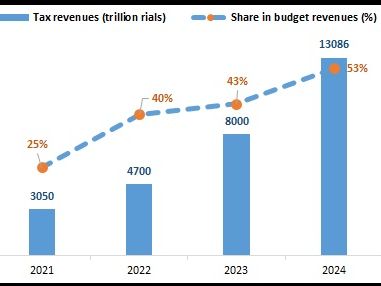
Surging tax revenues during former President Ebrahim Raisi’s tenure (Aug. 2021-May 2024) coincided with increasing poverty among Iranian citizens. For instance, per capita meat consumption declined by one-third between 2020 and 2023, according to the Food and Agriculture Organization of the United Nations (FAO) statistics.
Why government raises taxes?
Before US sanctions on Iran in 2018, about 40% of government budget was relied on oil revenues, but it declined to 21% in the current year, because of ‘maximum pressure’ oil sanctions.
The Iranian government projected total domestic sales and exports of oil and gas revenues in the budget at 6,414 trillion rials, about half of the tax revenues, or about $11 billion at current exchange rates. Officially, the government budget has less than a 50% share of oil export revenues: 14.5% of the petrodollars are allocated to the National Iranian Oil Company, 2.5% to deprived regions, and the remainder to the National Development Fund (NDF).
However, in recent years, the government has also appropriated the NDF's share of oil revenues to compensate for the budget deficit. Despite these measures, the government budget has consistently experienced a 30% deficit each year. This shortfall is due to oil revenues remaining significantly below pre-sanctions levels.
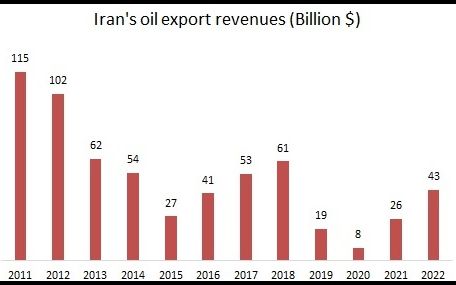
OPEC has not yet published its annual report for 2023, but Iran's customs statistics indicate that the country's oil export revenues were $37 billion during the last fiscal year. However, the actual cash income from crude exports to China remains a secret. Many observers believe some of the income is held in China for Iranian imports.
Another reason for rising tax revenues is inflation. According to the International Monetary Fund's estimates, the annual inflation rate has averaged above 42% since 2020.
However, even accounting for the inflation rate, the Iranian government should have increased taxation by a maximum of 160%, not 326%.

The husband of imprisoned journalist Saba Azarpeik disclosed on X that his wife was hospitalized on Tuesday due to severe bleeding, resulting in the termination of her pregnancy.
Ataollah Hafezi further revealed that in February, she lost another fetus at around two months old following a grueling nine-hour court session.
According to Hafezi, conservative presidential candidate and Parliament Speaker Mohammed Bagher Ghalibaf, alongside former MP Mohsen Dehnavi, ordered a legal case against the whistleblower.
Hafezi shared a video of Ghalibaf during a televised interview, in which he assured whistleblowers would be protected from repercussions under his presidency, to demonstrate the irony.
Azarpeik has been a vocal critic of the Iranian establishment, uncovering financial misconduct within its ranks. She is facing charges in two separate cases involving 15 private accusers.
The journalist has already been convicted in one case, receiving a three-year prison sentence and a fine for defamation and spreading false information. The legal proceedings of the other case, with eight private accusers, are ongoing.
Azarpeik's investigative journalism has exposed various corruption scandals, including those within the Tehran Municipality under Ghalibaf and the Ministry of Industry, Mines, and Trade under the administrations of both Hassan Rouhani and Ebrahim Raisi.
In 2009, she faced legal repercussions for reporting on police brutality and has been subjected to multiple arrests. In June 2014, she was detained on vague national security charges, enduring 40 days of solitary confinement before being released on bail in August 2014.
According to the 2024 World Press Freedom Index released by Reporters Without Borders (RSF) Iran is one of the world's largest jailers of journalists, cementing itself as one of the most repressive countries for press freedom. The Islamic Republic's targeted repression of journalists has resulted in the country's dismal ranking in the RSF Index, placing it 176th out of 180 countries assessed.
The pervasive censorship surrounding allegations of corruption has reached such heights that even presidential candidates in this month’s snap elections have been cautioned against disclosing each other's misdeeds. The elections follow the sudden death of Ebrahim Raisi and his delegation last month in a helicopter crash.
Each of the Guardian Council's approved presidential candidates, most of whom are close allies of the Supreme Leader, has been granted specific slots for their promotional campaigns on state television. Additionally, the forthcoming week will witness the live broadcasting of presidential debates.
Under the auspices of the state-run Islamic Republic of Iran Broadcasting (IRIB), presidential candidates have received warnings to prevent the tarnishing of the nation's image through their campaign broadcasts.
These warnings include the threat of broadcast suspension. This directive arrives amidst a broader crackdown on media content preceding the elections, emphasizing the imperative for candidates to abstain from defamation and behaviors detrimental to national unity and civic engagement.
The Press Supervisory Board of Iran issued a stern warning, declaring that those found guilty would face a penalty of 74 lashes for violations.
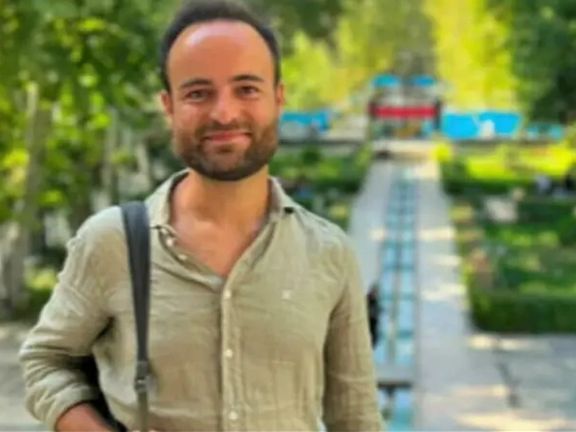
Iran has released French citizen Louis Arnaud who had been jailed since September 2022 and sentenced to five years in prison, President Emmanuel Macron announced Wednesday.
“He will be in France tomorrow after too long incarceration in Iran,” Macron said in a post on his X account.
He also thanked France’s “Omani friends and all those who worked towards this happy outcome.”
“This evening, I am also thinking of Cécile, Jacques and Olivier. I call on Iran to release them without delay,” Macron added.
Bilateral relations has deteriorated in recent months with Tehran holding four French citizens in what Paris has said are arbitrary arrests equivalent to state hostage taking.
France is also increasingly concerned by Iran's regional activities and the advance of its nuclear program.
On Monday, Tehran had announced ongoing efforts to secure the release of Bashir Biazar, a former managing director of Iran's state broadcaster who has been detained in France and is awaiting deportation.
Nasser Kanaani, the spokesperson for the Iranian Foreign Ministry, said Monday that diplomatic actions have been taken since the moment they were informed of Biazar’s arrest, without elaborating further.
“The Foreign Ministry and the Iranian Embassy have been actively following up on his case through diplomatic notes and phone calls,” he noted, adding that the ministry has also discussed his release with the French ambassador in Tehran, Nicolas Roche.
Sources had informed Iran International on Friday that the deportation process for Biazar is in progress following his detention. While Iranian officials assert that his arrest is linked to his anti-Israel activities, sources have disclosed to Iran International that he is facing multiple security-related charges. The nature of these charges is not clear, although in similar cases in the past Iranian diplomats and government employees abroad were found to have had links with Tehran's security and intelligence organs.
It is not clear if the two cases are related, but the timing of Arnaud's release raises possible questions.
Biazar has resided in France since 2022 on a long-term family visa due to his wife’s residency. Prior to his arrest, he posted a video of his speech at the UN Human Rights Council last November, in which he criticized Israel and the sanctions imposed on Iran. Previously living in London, Biazar Identified himself as the secretary of the Iran-backed Islamic Student Association of London in interviews with Iran’s state-run outlets such as the IRGC's Tasnim News Agency. He was later forced to leave the UK.
Arnaud, who had been held since September 2022 after travelling in the country, was sentenced to five years in prison in November on security charges. He was held in Tehran's notorious Evin prison.
"This evening, I also think of Cecile, Jacques and Olivier. I am calling on Iran to liberate them without delay," Macron said.
In recent years, Iran's elite Revolutionary Guards have arrested dozens of dual nationals and foreigners, mostly on charges related to espionage and security.
Rights groups have accused Iran of trying to extract concessions from other countries through such arrests. Iran, which does not recognize dual nationality, denies taking prisoners to gain diplomatic leverage.